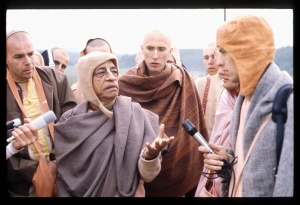SB 12.12.31-33: Difference between revisions
m (1 revision(s)) |
No edit summary |
||
| Line 1: | Line 1: | ||
{{info | {{info | ||
|speaker= | |speaker=Sūta Gosvāmī | ||
|listener=Sages of | |listener=Sages of Naimiṣāraṇya | ||
}} | }} | ||
[[Category:Srimad-Bhagavatam - Canto 12 Chapter 12]] | |||
[[Category:Bhagavatam Verses Spoken by Suta Gosvami - Vanisource|121233]] | |||
<div style="float:left">'''[[Srimad-Bhagavatam]] - [[SB 12|Twelfth Canto]] - [[SB 12.12: The Topics of Srimad-Bhagavatam Summarized|Chapter 12: The Topics of Śrīmad-Bhāgavatam Summarized]]'''</div> | |||
<div style="float:right">[[File:Go-previous.png|link=SB 12.12.30]] '''[[SB 12.12.30]] - [[SB 12.12.34]]''' [[File:Go-next.png|link=SB 12.12.34]]</div> | |||
{{RandomImage}} | |||
{{SBnotice}} | |||
==== TEXTS 31-33 ==== | ==== TEXTS 31-33 ==== | ||
<div | <div class="verse"> | ||
damanaṁ kāliyasyāher | :damanaṁ kāliyasyāher | ||
mahāher nanda-mokṣaṇam | :mahāher nanda-mokṣaṇam | ||
vrata-caryā tu kanyānāṁ | :vrata-caryā tu kanyānāṁ | ||
yatra tuṣṭo 'cyuto vrataiḥ | :yatra tuṣṭo 'cyuto vrataiḥ | ||
prasādo yajña-patnībhyo | |||
viprāṇāṁ cānutāpanam | :prasādo yajña-patnībhyo | ||
govardhanoddhāraṇaṁ ca | :viprāṇāṁ cānutāpanam | ||
śakrasya surabher atha | :govardhanoddhāraṇaṁ ca | ||
yajñabhiṣekaḥ kṛṣṇasya | :śakrasya surabher atha | ||
strībhiḥ krīḍā ca rātriṣu | |||
śaṅkhacūḍasya durbuddher | :yajñabhiṣekaḥ kṛṣṇasya | ||
vadho 'riṣṭasya keśinaḥ | :strībhiḥ krīḍā ca rātriṣu | ||
:śaṅkhacūḍasya durbuddher | |||
:vadho 'riṣṭasya keśinaḥ | |||
</div> | </div> | ||
| Line 25: | Line 32: | ||
==== SYNONYMS ==== | ==== SYNONYMS ==== | ||
<div | <div class="synonyms"> | ||
damanam—the subduing; kāliyasya—of Kāliya; aheḥ—the snake; mahā-aheḥ—from the great serpent; nanda-mokṣaṇam—the rescue of Mahārāja Nanda; vrata-caryā—the execution of austere vows; tu—and; kanyānām—of the gopīs; yatra—by which; tuṣṭaḥ—became satisfied; acyutaḥ—Lord Kṛṣṇa; vrataiḥ—with their vows; prasādaḥ—the mercy; yajña-patnībhyaḥ—to the wives of the brāhmaṇas performing Vedic sacrifices; viprāṇām—of the brāhmaṇa husbands; ca—and; anutāpanam—the experience of remorse; govardhana-uddhāraṇam—the lifting of Govardhana Hill; ca—and; śakrasya—by Indra; surabheḥ—along with the Surabhi cow; atha—then; yajña-abhiṣekaḥ—the worship and ritual bathing; kṛṣṇasya—of Lord Kṛṣṇa; strībhiḥ—together with the women; krīḍā—the sporting; ca—and; rātriṣu—in the nights; śaṅkhacūḍasya—of the demon Śaṅkhacūḍa; durbuddheḥ—who was foolish; vadhaḥ—the killing; ariṣṭasya—of Ariṣṭa; keśinaḥ—of Keśī. | damanam—the subduing; kāliyasya—of Kāliya; aheḥ—the snake; mahā-aheḥ—from the great serpent; nanda-mokṣaṇam—the rescue of Mahārāja Nanda; vrata-caryā—the execution of austere vows; tu—and; kanyānām—of the ''gopīs''; yatra—by which; tuṣṭaḥ—became satisfied; acyutaḥ—Lord Kṛṣṇa; vrataiḥ—with their vows; prasādaḥ—the mercy; yajña-patnībhyaḥ—to the wives of the ''brāhmaṇas'' performing Vedic sacrifices; viprāṇām—of the ''brāhmaṇa'' husbands; ca—and; anutāpanam—the experience of remorse; govardhana-uddhāraṇam—the lifting of Govardhana Hill; ca—and; śakrasya—by Indra; surabheḥ—along with the Surabhi cow; atha—then; yajña-abhiṣekaḥ—the worship and ritual bathing; kṛṣṇasya—of Lord Kṛṣṇa; strībhiḥ—together with the women; krīḍā—the sporting; ca—and; rātriṣu—in the nights; śaṅkhacūḍasya—of the demon Śaṅkhacūḍa; durbuddheḥ—who was foolish; vadhaḥ—the killing; ariṣṭasya—of Ariṣṭa; keśinaḥ—of Keśī. | ||
</div> | </div> | ||
{{SBcollapse}} | |||
==== TRANSLATION ==== | ==== TRANSLATION ==== | ||
<div | <div class="translation"> | ||
The chastisement of the serpent Kāliya; the rescue of Nanda Mahārāja from a great snake; the severe vows performed by the young gopīs, who thus satisfied Lord Kṛṣṇa; the mercy He showed the wives of the Vedic brāhmaṇas, who felt remorse; the lifting of Govardhana Hill followed by the worship and bathing ceremony performed by Indra and the Surabhi cow; Lord Kṛṣṇa's nocturnal pastimes with the cowherd girls; and the killing of the foolish demons Śaṅkhacūḍa, Ariṣṭa and Keśī—all these pastimes are elaborately recounted. | The chastisement of the serpent Kāliya; the rescue of Nanda Mahārāja from a great snake; the severe vows performed by the young gopīs, who thus satisfied Lord Kṛṣṇa; the mercy He showed the wives of the Vedic brāhmaṇas, who felt remorse; the lifting of Govardhana Hill followed by the worship and bathing ceremony performed by Indra and the Surabhi cow; Lord Kṛṣṇa's nocturnal pastimes with the cowherd girls; and the killing of the foolish demons Śaṅkhacūḍa, Ariṣṭa and Keśī—all these pastimes are elaborately recounted. | ||
</div> | </div> | ||
__NOTOC__ | </div> | ||
</div> | |||
<div style="float:right">[[File:Go-previous.png|link=SB 12.12.30]] '''[[SB 12.12.30]] - [[SB 12.12.34]]''' [[File:Go-next.png|link=SB 12.12.34]]</div> | |||
__NOTOC__ | |||
__NOEDITSECTION__ | |||
Revision as of 09:35, 1 July 2021

A.C. Bhaktivedanta Swami Prabhupada
Please note: The synonyms, translation and purport of this verse were composed by disciples of Śrīla Prabhupāda
TEXTS 31-33
- damanaṁ kāliyasyāher
- mahāher nanda-mokṣaṇam
- vrata-caryā tu kanyānāṁ
- yatra tuṣṭo 'cyuto vrataiḥ
- prasādo yajña-patnībhyo
- viprāṇāṁ cānutāpanam
- govardhanoddhāraṇaṁ ca
- śakrasya surabher atha
- yajñabhiṣekaḥ kṛṣṇasya
- strībhiḥ krīḍā ca rātriṣu
- śaṅkhacūḍasya durbuddher
- vadho 'riṣṭasya keśinaḥ
SYNONYMS
damanam—the subduing; kāliyasya—of Kāliya; aheḥ—the snake; mahā-aheḥ—from the great serpent; nanda-mokṣaṇam—the rescue of Mahārāja Nanda; vrata-caryā—the execution of austere vows; tu—and; kanyānām—of the gopīs; yatra—by which; tuṣṭaḥ—became satisfied; acyutaḥ—Lord Kṛṣṇa; vrataiḥ—with their vows; prasādaḥ—the mercy; yajña-patnībhyaḥ—to the wives of the brāhmaṇas performing Vedic sacrifices; viprāṇām—of the brāhmaṇa husbands; ca—and; anutāpanam—the experience of remorse; govardhana-uddhāraṇam—the lifting of Govardhana Hill; ca—and; śakrasya—by Indra; surabheḥ—along with the Surabhi cow; atha—then; yajña-abhiṣekaḥ—the worship and ritual bathing; kṛṣṇasya—of Lord Kṛṣṇa; strībhiḥ—together with the women; krīḍā—the sporting; ca—and; rātriṣu—in the nights; śaṅkhacūḍasya—of the demon Śaṅkhacūḍa; durbuddheḥ—who was foolish; vadhaḥ—the killing; ariṣṭasya—of Ariṣṭa; keśinaḥ—of Keśī.
Translation and purport composed by disciples of Śrīla Prabhupāda
TRANSLATION
The chastisement of the serpent Kāliya; the rescue of Nanda Mahārāja from a great snake; the severe vows performed by the young gopīs, who thus satisfied Lord Kṛṣṇa; the mercy He showed the wives of the Vedic brāhmaṇas, who felt remorse; the lifting of Govardhana Hill followed by the worship and bathing ceremony performed by Indra and the Surabhi cow; Lord Kṛṣṇa's nocturnal pastimes with the cowherd girls; and the killing of the foolish demons Śaṅkhacūḍa, Ariṣṭa and Keśī—all these pastimes are elaborately recounted.